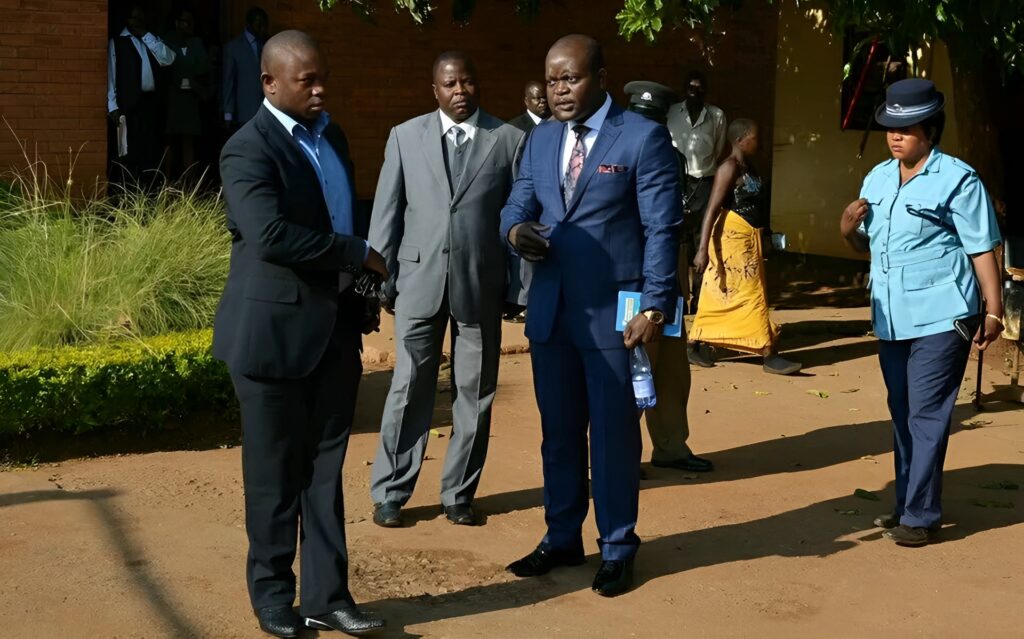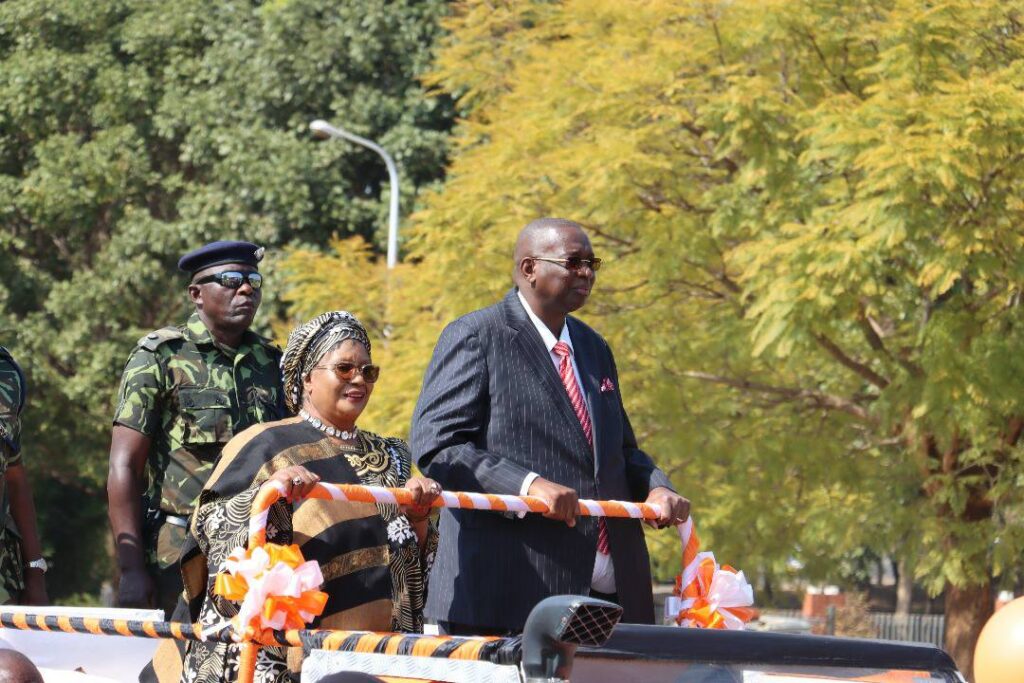In a tragicomic twist fit for a satirical political play, Malawi’s September elections are shaping up to be the ultimate rematch of discredited legacies, where irony seems to be the only honest campaigner.
On one end, former President Joyce Banda has resuscitated the ghost of the 2013 Cashgate scandal by pairing up with none other than her former Vice President Khumbo Kachali, the same man who stood by her side when billions of taxpayer funds were siphoned through government accounts.

Remember the then Budget Director Paul Mphwiyo being shot in the face and left deformed for life under mysterious circumstances!
To be honest, the Banda–Kachali ticket is nothing short of a reunion tour of a regime whose most enduring legacy was an ATM machine for looters.
On the other end of the political circus, the Democratic Progressive Party (DPP) has outdone itself in insensitivity and cynicism by naming former Malawi Electoral Commission (MEC) chairperson Justice Dr. Jane Ansah as the running mate to its presidential torchbearer, Arthur Peter Mutharika.
Ansah, infamously remembered as the “Tipp-Ex Lady,” presided over the 2019 electoral mess that sparked months of deadly nationwide protests and judicial nullification. And yet, with a straight face, Mutharika during his nomination speech, hailed that very election, which nearly plunged the country into civil conflict as “one of the best-run elections in the world”.
The appointment reeks of political amnesia, or worse, deliberate provocation to the sanity of Malawians.
Together, these two pairs—one representing the darkest days of public looting and the other symbolizing the collapse of electoral credibility—encapsulate everything wrong with Malawi’s political elite.
As the nation inches toward the September polls, voters are being dragged backward by the very forces they once rejected, with choices that feel more like recycled nightmares than real democratic options.
Much has already been said about the Mutharika-Ansah ticket but let us take a closer look at the other duo—the Cashgate Duo, a ticket that has sent shockwaves across Malawi’s political spectrum.
Ten years after the financial hemorrhage that became known as Cashgate, the same political faces who oversaw the rot are back, asking for another chance.
For many Malawians, this represents not a second chance at redemption, but a dangerous attempt to revive the architecture of looting and political impunity that crippled the country.

The announcement immediately reignited painful memories of the infamous Cashgate scandal, widely considered the biggest financial scandal in Malawi’s democratic history.
Critics say the pairing of Banda and Kachali is tantamount to the reunion of a regime that presided over the systematic looting of public resources. The scandal, which came to light in 2013 under their leadership, involved the embezzlement of billions of kwacha through fraudulent payments orchestrated by top government officials and aided by a compromised financial system.
The Cashgate corruption scandal broke open in September 2013 following the shooting of the then Budget Director Paul Mphwiyo outside his Area 43 home in Lilongwe.
The failed assassination attempt set off a chain of investigations that unveiled a deep-rooted financial conspiracy involving senior civil servants, businesspersons, and politicians, who manipulated the government’s Integrated Financial Management Information System (IFMIS) to siphon off massive sums of public money.
Soon after the shooting, forensic audits and arrests began, revealing that government ministries were making payments for goods and services that were never delivered, or were wildly inflated, and in some cases, channeled directly into private accounts.
Investigations uncovered that over K24 billion (approximately $30 million at the time) had been stolen between April and September 2013 alone.
Though Banda publicly claimed credit for initiating the investigations and sacking some implicated officials, many Malawians and international observers viewed her response as reactive, rather than proactive, and deeply insufficient.
The scandal significantly dented donor confidence, with most of Malawi’s traditional partners suspending direct budgetary support, a blow from which the country has never fully recovered.
At the height of the scandal, the then Vice President remained largely silent.
While no direct evidence implicated him in the scheme, his proximity to power and silence during a time of unprecedented theft from public coffers has continued to taint his legacy.
The Banda-Kachali administration was accused of fostering a climate of impunity and weakening accountability mechanisms, which emboldened civil servants to exploit IFMIS unchecked.
In the aftermath, the 2014 general election proved disastrous for the People’s Party. Joyce Banda finished third, and the party failed to secure any significant parliamentary or local government presence.
Kachali distanced himself from Banda, going on to form his own political group, the Freedom Party. However, his political weight gradually waned, leading many to view his reemergence this week as a tactical alliance borne out of necessity rather than principle.
The announcement of the Banda-Kachali ticket has sparked fierce backlash from both the public and rival political camps. Social media was awash with angry reactions, with many users branding the pair as the “Cashgate Team Reunited” or the “2013 Looting Duo.”
“This is a direct insult to Malawians. Instead of apologizing for the harm they caused to this nation, Joyce Banda and Khumbo Kachali are regrouping for another attempt at power, as if 2013 never happened,” said one Facebook user “
Another social media user tweeted: “This is a dangerous normalization of grand corruption.”
In response to the backlash, Joyce Banda has defended her legacy, claiming that her administration “uncovered and exposed Cashgate” and insisted that she never benefited from the looting.
“If I were involved, I would have stopped the investigation. Instead, I empowered the ACB and invited international auditors,” she told a private radio station in an interview yesterday.
However, auditor reports and donor statements from the time tell a different story.
While it is true that Banda’s administration allowed investigations to proceed after Mphwiyo’s shooting, critics argue that Cashgate was already too big to suppress and that her failure to prevent the collapse of financial control systems made her administration complicit by negligence.
Furthermore, the fact that Paul Mphwiyo, whose shooting exposed the scandal, was personally appointed by Joyce Banda just weeks before the scandal erupted has raised suspicions that he was part of a high-level financial maneuvering operation that eventually went wrong.
Mphwiyo was later arrested and charged with theft and money laundering.
His trial is still ongoing, with damning testimony implicating several key figures of that time, but the political class has largely escaped formal consequences.
The return of Banda and Kachali to the presidential race adds a chaotic twist to an already unpredictable election.
While their joint candidacy is unlikely to mount a serious challenge to frontrunners like President Dr. Lazarus McCarthy Chakwera, it may split votes in the North and parts of the South, denying the DPP, with hopes to have a monopoly of the South and banking on their newly formed alliance with the North, a chance for a comeback.
Analysts also warn that this ticket could reawaken voter apathy.
“You can’t repackage failure and expect enthusiasm. This is a major miscalculation that may end up hurting both PP and the opposition as a whole,” said a political analyst at University of Malawi.
There is also a broader concern about what their candidacy signals about Malawi’s fight against corruption.
After years of judicial delays, selective prosecution, and political recycling of tainted figures, many fear that impunity has become institutionalized, and that Cashgate, for all its notoriety, remains an unresolved chapter in the nation’s quest for justice.
As the 2025 election heats up, voters are left to weigh promises against painful memories. But if the past is any guide, the Banda-Kachali ticket may turn out to be not a platform of hope—but a ghost of corruption returning to haunt a fragile democracy.








